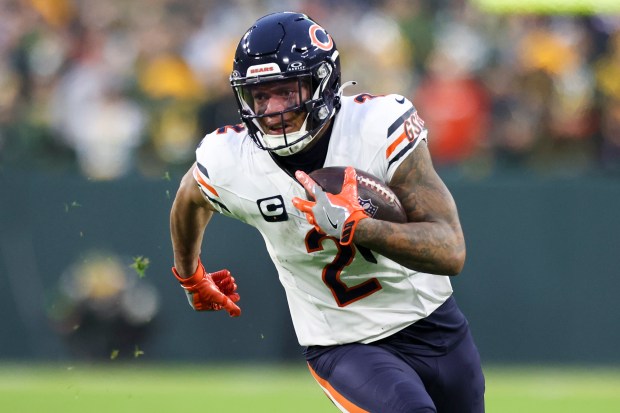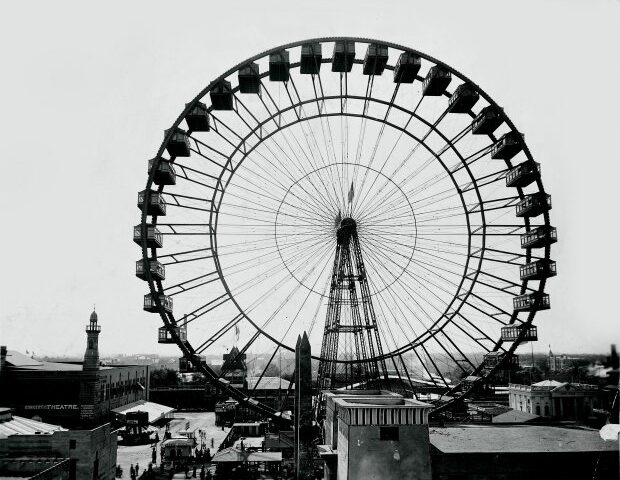If Caleb Williams has done any sort of extensive homework on the 104 seasons of Chicago Bears quarterback history, it wasn’t apparent when he met with a massive media horde at the NFL scouting combine earlier this month.
Less than two minutes into his rapid-fire Q-and-A session on a brightly lit stage in Indianapolis, Williams was reminded that the Bears “haven’t had a whole lot of dominant quarterback play” and was asked if that affected him at all.
“No,” he said. “Not at all. I don’t compare myself to the other guys who are there or have been there. I think I’m my own player.”
And then he dropped the line that will follow him into the NFL and throughout his professional playing career.
“I tend to like to create history and rewrite history,” Williams said.
Well, kid, the pen should be yours soon, with a stack of blank pages to be authored, presumably for the next several chapters of Bears history.
With Saturday’s trade of Justin Fields to the Pittsburgh Steelers for a conditional Day 3 draft pick in 2025, Bears general manager Ryan Poles cleared the way to draft a quarterback with the No. 1 pick next month. And the consensus inside league circles is that Williams is the likely selection.
Barring a twist over the next five weeks, that would put the 22-year-old Heisman Trophy winner from USC into his new orange Bears practice jersey for the first day of rookie minicamp on May 10 at Halas Hall.
It also would drop Williams into a football-crazed and failure-scarred community that anticipates his arrival with much fervor.
Some are ready to welcome Williams to Chicago with uncontrollable glee. Others are waiting with extreme skepticism.
Williams will be billed as the franchise quarterback who has arrived to help Poles make good on his vow for the Bears to “take the North and never give it back.” And he will be scrutinized by disbelievers who will challenge him with a “prove it” proviso.
Yet as much as Williams will be tested to ride the NFL’s quarterback roller coaster with enthusiasm and equanimity, Bears fans will be tested to recalibrate their QB1 expectations to a reasonable level.
And if last weekend’s reaction to the Fields trade is any indication, that might be one of the more difficult asks within this ongoing saga.
Moving forward

Poles’ decision to pivot at quarterback and reboot with a new prospect already qualifies as prudent. Fields’ inability, at the end of three seasons, to clear several critical developmental checkpoints accelerated his exit from a city where so many fell in love with his playmaking flashes and team-driven mentality.
Couple that with the opportunity knocking for the Bears with this year’s No. 1 selection, and most folks within the NFL see this as a “no regrets” change of course.
Still, for Poles’ defining move as GM to one day qualify as a success, whichever quarterback he drafts will have to not only outperform Fields over the next decade, but also, more importantly, become the engine of a sustained run of success. That should not be up for debate. That’s why these dice are being rolled.
If Williams plans to rewrite history, Chicago expects to see at least an outline, if not a rough draft, by the end of 2024.
The Bears’ last playoff victory came on Jan. 16, 2011. Williams was 9 years old.
They haven’t enjoyed back-to-back winning seasons since 2005-06. Williams was not yet in kindergarten.
The last time they reached the playoffs in at least three consecutive years was 1988. At that point, Poles was 3.
So, yes, there’s a looooong track record of futility to reverse. But this is exactly the kind of challenge Williams covets.
The clock is ticking

Bears quarterback Justin Fields leaves the field after a 20-17 loss to the Browns on Dec. 17, 2023, in Cleveland. (Brian Cassella/Chicago Tribune)
But what about the developmental deadline some will impose on Williams as he prepares to join a Bears roster capable of playoff contention right away? What promises to get confusing — perhaps even ugly — in the evaluation of the next Bears quarterback is the size of the hourglass the outside world will use as the timer for success.
In the wake of Fields’ exit last weekend, social media already teemed with supersized Williams expectations from the angriest of Bears fans who made it clear they weren’t going to be patient waiting around for a breakthrough.
If this kid is as good as all the evaluators say, then it should be fair to expect a C.J. Stroud-like rookie season at a bare minimum.
All the talking heads have been promising that Williams is the next Patrick Mahomes. So why shouldn’t he be expected to throw for 5,000 yards and 50 touchdowns in his first season as a starter?
If the “generational talent” label has been applied to Williams ad nauseam for two years, doesn’t that require him to be great immediately?
For those able to summon a healthy level of reason, the irony in those declarations is thick. Some of the same fans who spent the last 18 months defending Fields’ inconsistency with examples of star quarterbacks who had to push through significant early struggles are now the same people demanding Williams become an overnight sensation.
That, some have argued, is the only way to justify trading a player as exciting and dynamic as Fields, the only way to validate turning away a large gift basket of draft picks to instead spend the No. 1 pick on a quarterback.
Never mind that the Bears played 51 games over the last three seasons and won only 10 with Fields as their starting quarterback. Somehow, the expectation in some pockets is that Williams — thanks to his own recognized talent plus the supporting cast he will be given — should be expected to win 10 games by New Year’s Day.
For some it’s “playoffs or bust,” a “he better win now or else” proposition. To which the logical follow-up question is this: Or else what?
A panicked and premature declaration of failure after one season?
A housecleaning of the coaching staff with no room for nuanced discussion?
For real?
Ready for launch
Bears wide receiver DJ Moore runs after a catch against the Packers on Jan. 7, 2024, at Lambeau Field. (Eileen T. Meslar/Chicago Tribune)
If the Bears indeed pick Williams at No. 1, he will walk into a far better situation at Halas Hall than Fields had at any point in his three seasons. The offense Williams is positioned to take over is stacked with weapons, from DJ Moore and Keenan Allen to Cole Kmet and D’Andre Swift. And there’s potential for more additions over the next six weeks.
Williams also will be supported by an on-the-rise defense that promises to keep the Bears in most games and might have the potential to carry the team regularly next season.
Simply put: The Bears should be vying for a playoff berth. That’s realistic.
Unfortunately, though, with emotions running hot around these parts, Williams might not be afforded anywhere near the level of patience Fields received if he struggles.
For three seasons, the most passionate Fields backers offered unconditional forgiveness, readily pinning the quarterback’s biggest flaws — inadequate pocket feel, hesitation to pull the trigger and game-on-the-line struggles — on other people, other factors, other issues.
Williams, by contrast, likely will be pressed to emerge as an obvious top-tier quarterback much quicker — if not by the end of his rookie season then certainly by Thanksgiving 2025.
That’s something the Bears must be aware of, something they will have to manage.
Poles, with his chill and relaxed demeanor, must become the most grounded and level-headed observer of all of this, retaining his long view and setting reasonable benchmarks for Williams along the developmental road. Then he and the organization must find ways to emphatically message those to the masses.
Quiet, please

Make no mistake: Williams will struggle. All young quarterbacks do. There will be frustrating stretches of inconsistency and inexplicable turnovers and inevitable growing pains. Especially next season.
To acknowledge that reality isn’t lowering the bar or moving the goal posts or reconfiguring expectations. It’s creating the kind of civic sanity that should help a young quarterback have his chance to have a chance.
Just as the home team’s quarterback works to quiet the stadium before a crucial third down, Poles and the Bears should be flapping their arms to control the volume of all the noise Williams will have to listen to in the early stages of his career.
In the end, though, the Bears are betting on Williams to be great. Eventually.
He’ll be expected to become the first 4,000-yard passer in franchise history and the first Bear to throw for 30 touchdowns in a season.
Williams will be expected to become a Pro Bowl-caliber producer for years on end. And he will be expected to become a winner, putting the Bears into the playoffs on a regular basis and then propelling them into those energizing postseason moments.
Ultimately, his legacy will hinge on how he performs on that stage, his performance review defined by the history he writes.




